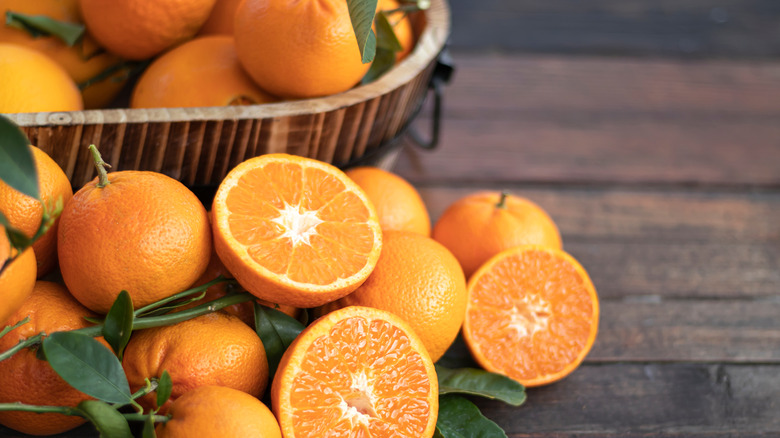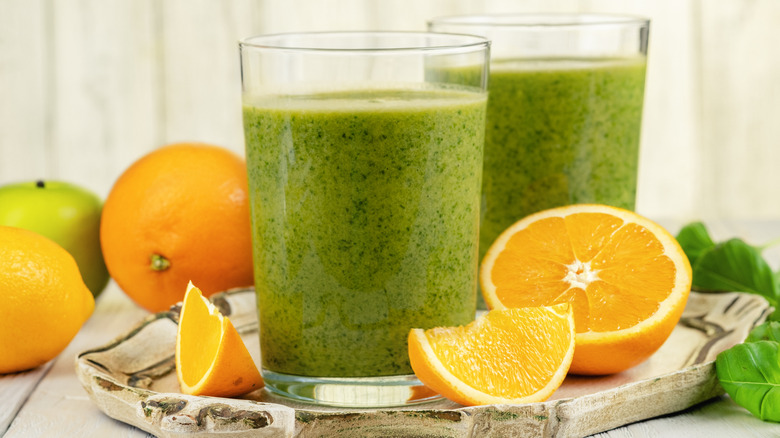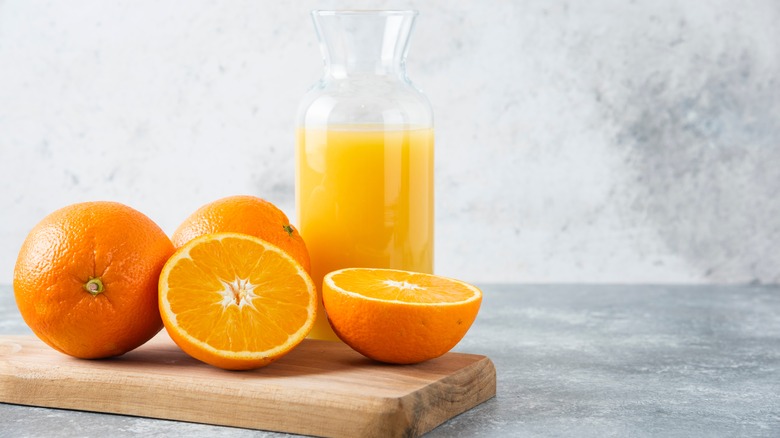What Happens To Your Body When You Eat Oranges Every Day
You've surely heard that an apple a day keeps the doctor away, but what about an orange a day? It sure can't hurt. Sweet and tangy, oranges make a delicious snack, and they also offer a boost of nutrition to your diet. Like other citrus fruits, oranges are chock full of vitamin C and antioxidant nutrients and have been shown to have numerous health benefits, from protecting heart and cognitive health to aiding weight loss (via BBC GoodFood and Healthline). One medium orange counts as one serving of fruit, and the American Heart Association recommends adults have four servings of fruit a day for optimal health.
With more than 600 varieties to explore, from the well-loved navel orange to types such as blood oranges with their bright red flesh, you'll never get bored (via Harry & David). No matter your favorite type, you can incorporate oranges and all their nutritional benefits into your diet in so many ways. From a perfectly portable snack to a tangy addition to salads, sauces, and baked dishes, there are so many ways to make eating oranges every day a nutritious and delicious habit.
You'll improve your heart health
Any type of fruit is good for your heart, and the American Heart Association says that eating four to five servings every day can help improve cardiovascular health. One reason for this is the fiber content in fruit. One medium orange has 3 grams of fiber, or 11% of the Daily Value (DV), according to MyFoodData. Fiber is the indigestible part of plant foods that passes through your body mainly unchanged. One type of fiber in particular, called soluble fiber, is able to attract unhealthy low-density lipoprotein (LDL) cholesterol and carry it out of the body as waste (via National Lipid Association). High levels of LDL cholesterol increase your chances of experiencing major health issues like heart disease and stroke, as the Centers for Disease Control and Prevention (CDC) explains. UCSF Health reports that experts recommend getting about 6 to 8 grams of soluble fiber each day — and according to Today's Dietitian, among fruits, oranges are a top source of soluble fiber, providing 1.8 grams per small fruit.
You'll lower your risk of cognitive decline
You might be surprised to hear that you can start to experience the effects of cognitive decline — a reduction in the brain power that allows you to think, learn, remember, and perform a host of other functions — as early as your 20s and 30s (via Theories of Cognitive Aging and Work and Neurobiology of Aging). The good news: Eating fruits and vegetables rich in antioxidants can prevent it. Antioxidants from plant foods can help neutralize free radicals that attack healthy cells and cause disease.
Oranges are especially rich in a type of antioxidant called flavonoids, a high intake of which has been linked with reduced cognitive decline, according to the American Academy of Neurology. Results of a 2021 study published in Neurology found that out of nearly 70,000 adults followed over 20 years, those who had a higher flavonoid intake had a lower risk of subjective cognitive decline (SCD), or self-assessed problems with cognitive decline. The top 20% of flavonoid consumers had about 600 mg in their diet each day. For reference, 100 grams — about 3.5 ounces — of raw orange contains 43 milligrams of flavones, per USDA data. Other top sources of this brain-boosting antioxidant include peppers, celery, grapefruits, grapefruit juice, apples, and pears (via American Academy of Neurology).
You'll boost your immune system
At some point in your life, you've probably heard you should drink orange juice when you have a cold. The truth is, once you already have a cold, it's probably not going to help much. But eating oranges and other fruits and vegetables regularly can boost your body's immune defenses. Like all citrus fruits, oranges are a rich source of the antioxidant nutrient vitamin C. According to the National Institutes of Health (NIH), vitamin C helps protect your cells from damage from free radicals created when your body converts food into energy. You are also exposed to free radicals from air pollution, ultraviolet rays from the sun, and cigarette smoke.
Additionally, oranges are also a good source of the B vitamin folate (via Frontiers in Immunology). Both vitamin C and folate help to protect the integrity of your body's immunological barrier and support the functioning of several types of immune cells, such as phagocytes, natural killer cells, T-cells, and B-cells. For a healthy immune system, adult women need 75 mg of vitamin C daily and men need 90 mg (via NIH). Additionally, all adults need 400 mcg of folate (via the NIH). One medium orange has 70 mg of vitamin C and 40 mg of folate (via MyFoodData)
You'll have glowing skin
The vitamin C found in abundance in oranges plays a variety of roles in maintaining healthy skin. According to a 2018 review in Frontiers in Physiology, vitamins C aids in the differentiation of keratinocytes, a process that's crucial for healthy skin (via Frontiers in Cell Development and Biology). It also decreases melatonin synthesis, which enhances antioxidant protection against damaging UV rays from the sun. A deficiency in vitamin C can actually cause or exacerbate skin problems, including atopic dermatitis, or eczema — a condition that causes dry, itchy, and inflamed skin (via Frontiers in Physiology and the Mayo Clinic).
Vitamin C also plays a critical role in the formation of collagen, a protein that forms the basic structure of the skin (via Plastic and Aesthetic Research). Healthy collagen production is associated with a reduction in premature aging of the skin. Oranges also contain naringenen, a flavonoid compound that helps your body maintain adequate levels of hyaluronic acid (via Healthline). Hyaluronic acid is a substance naturally produced by the body that helps keep the skin lubricated and elastic, according to the Cleveland Clinic.
You'll recover more easily
With its role in forming collagen, vitamin C is crucial for wound healing and recovering from illness, surgery, and injuries. The body uses vitamin C at a higher rate post-injury, and increased vitamin C intake can help speed wound-healing, per a 2016 study in the International Wound Journal. This is also why it's often promoted as an important supplement in the fitness world. According to a 2006 study in the International Journal of Sports Nutrition and Exercise Metabolism, increased vitamin C intake before and after strenuous weight training notably reduced muscle soreness in the first 24 hours post-exercise compared to a placebo. Peeling a fresh juicy orange before or after your next weight room workout might be just what the doctor ordered.
Getting plenty of vitamin C is also crucial if you are going to be undergoing surgery. According to a review in Current Opinion in Clinical Nutrition and Metabolic Care, blood vitamin C concentrations fall after surgery proportionate to the intensity of the surgery, and daily requirements of the nutrient rise by 500 mg or more. If you love oranges, post-surgery is a great time to indulge, assuming your doctor gives you the ok.
You'll reduce your cancer risk
Numerous studies have shown that eating plenty of fresh fruits and vegetables can reduce your risk of disease, including many different types of cancers (via Cancer Council). This is due to their high levels of antioxidant nutrients that fight free radical damage. Oranges, along with other citrus fruits, may have particular benefit when it comes to reducing lung cancer risk. According to results of a 2020 research review in Pharmacological Research, people with the highest intake of citrus fruits had a 9% lower chance of developing lung cancer than those with the lowest citrus fruit intake. A 2008 research review in Gastric Cancer found similar results for stomach cancer. In the 14 studies reviewed, high intake of citrus fruits lowered one's risk of developing stomach cancer by 28%. A 2010 study in the International Journal of Cancer found that among 42,470 Japanese adults ages 40 to 79, incorporating a high amount of citrus fruit into the diet was associated with a lower risk of all cancers. This was especially true when subjects also consumed high amounts of green tea, another antioxidant powerhouse.
You'll be able to control your weight more easily
Could something so naturally sweet and delicious actually help you lose weight? You're not dreaming. According to a 2020 review and meta-analysis in Phytotherapy Research, four weeks intervention of dietary citrus or its extract significantly reduced body weight, body mass index (BMI), and waist circumference in participants in 13 randomized controlled trials. Fruits and vegetables in general are some of the best foods for weight loss (via the CDC). They are low in calories, which helps you maintain a calorie balance so that your body burns more energy than you consume — which is the key to weight maintenance and weight loss (via the Mayo Clinic). They are also high in fiber, which doesn't provide calories but does slow stomach emptying, which can help you stay feeling full for longer after a meal so that you eat less (via Healthline). Indeed, according to Harvard Health, simply getting more fiber in your diet can be a huge factor in weight loss. Women should aim to get about 21 to 25 grams of fiber each day and men need 30 to 38 grams (via the Mayo Clinic). One cup of orange segments provides just 85 calories and over 4 grams of fiber (via MyFoodData).
You'll protect your eyesight
Carrots and oranges have more in common than just their bright orange color — they both benefit your eyesight. The same antioxidant flavonoids that can help your cognitive health and skin can also protect your vision. A 2018 study in The American Journal of Nutrition found an association between flavonoid intake and decreased risk of age-related macular degeneration (AMD) — one of the main conditions leading to vision loss and blindness in people over age 65. Specifically, the researchers noted that eating one serving of oranges each day could provide adequate amounts of flavonoids to significantly lower the risk of developing this condition by as much as 60%. Interestingly, other flavonoid-filled foods the study examined, including tea, red wine, beer, and apples, did not have the same protective effects as oranges. Even eating an orange a week could offer benefits, lead researcher Bamini Gopinath told the American Optometric Association. In this case, an orange every few days just might keep the eye doctor away.
You'll reduce your risk of anemia
A deficiency in the mineral iron can result in anemia, a condition in which someone has lowered levels of red blood cells (via the Mayo Clinic). These cells are crucial to making sure all the tissues in the body receive the oxygen they need for optimal functioning — and without enough iron, your body can't make the quantity of red blood cells it needs. You might not even notice a mild deficiency, but as your blood iron levels decrease, you may feel exhausted or find it hard to breathe. Other symptoms may include paleness, chest pain, accellerated heartbeat, headache, cold hands and feet, or even cravings for non-food items like dirt, ice, or starch.
According to the NIH, iron deficiency is a common health issue most often seen in women under 50, people who don't eat animal foods, and those with health conditions that affect how their bodies absorb nutrients. Oranges can help. When consumed at the same time as iron-rich foods, the vitamin C in oranges can aid absorption of iron. A 2016 study in the Journal of Food Science and Technology showed that when orange — along with other fortifying ingredients — was added to basic Indian meals of rice or dal, the bioavailability of iron in the meal increased by five times. Iron deficiency anemia should be treated by your doctor, but pairing oranges with your favorite high-iron foods is a good way to ensure you're meeting your iron needs.
You'll stay hydrated
About 50-70% of your body is made up of water, and staying hydrated is critical for maintaining your health and feeling good every day (via the Mayo Clinic). Even minor dehydration can cause unwanted side effects such as fatigue, headaches, and difficulty concentrating, according to a 2012 study in The Journal of Nutrition. Women need about 11.5 cups of fluids each day, and men need 15.5 cups, which is quite a hefty amount to try to chug down in your waking hours (via the Mayo Clinic). The good news is that not all of that has to be water. Fruits like fresh oranges can offer a nutritious and delicious option to augment your water intake and help you stay hydrated. According to Michigan State University, oranges are 87% fluid. They're an especially good way to rehydrate after sports and exercise because they can also replenish electrolyte minerals, such as potassium, that are lost through sweat (via Healthline).
You'll have less anxiety
Nearly 20% of adults have an anxiety disorder, according to National Institute of Mental Health (NIMH), of which worrying, fear, panic, and insomnia are just a few of the common side effects. Although it's not a cure for a diagnosed mental disorder, eating an orange a day — plus other fresh fruits and vegetables — may be help you take the edge off. According to a 2105 study in the Pakistan Journal of Biological Sciences, the antioxidant vitamin C plays a role in anxiety, fatigue, depression, and mood state in humans due to the negative effects of oxidative stress on neurophysiology. Just as free radicals attack healthy cells and damage physical health, they can also degrade mental health. Study researchers found that 500 mg of vitamin C daily reduced anxiety in high school students compared to a placebo. The researchers concluded that vitamin C could play a therapeutic role for those with anxiety, if used in addition to medical and psychological care.
Eating whole oranges versus drinking orange juice
Maybe you're wondering if you could skip the hassle of peeling an orange and get the same benefits by just drinking a glass of juice instead? Yes and no. Some research has shown that certain antioxidants may be more bioavailable in orange juice versus the whole fruit — however, this depends on many factors, including how the juice has been processed (via NPR). Squeezing fresh OJ yourself is a lot different than buying it in a jug at the store, because commercial heat processing of orange juice can degrade its nutritional value (via Food Reviews International). There's little risk of that when you're juicing fresh fruits at home, however.
Additionally, fruit juice is a concentrated source of sugars. Even though they're natural (mostly — beware of juices with added sugar!), they still absorb very quickly into your bloodstream, which can cause blood sugar spikes (via NPR). The fiber in whole fruit slows the absorption of sugars into your bloodstream. Fiber is also filling, which is important if you're trying to lose or manage your weight. There are more than double the number of calories in a glass of orange juice as there are in a single medium orange, but you're likely to gulp down a glass of juice far faster than you can eat an orange (via MyFoodData). If you enjoy a glass of fresh-squeezed OJ every now and again, there's no reason to deny yourself; but in general, peeling and eating the whole fruit is a better choice than drinking the juice.













